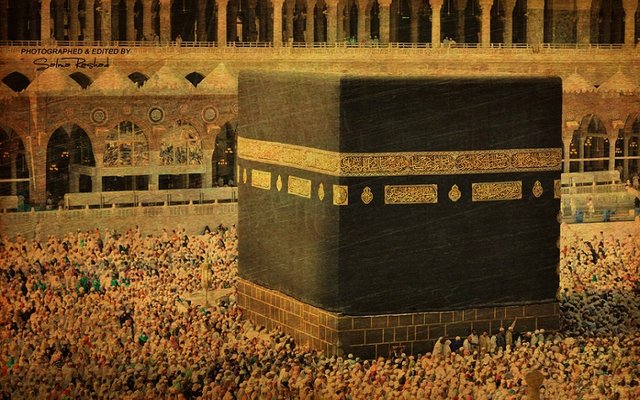HISTORY IS ISLAM
The history of Islam concerns the political, social,economic and cultural developments of the Islamic civilization. Despite concerns about the reliability of early sources, most historians.
believe that Islam originated in Mecca and Medina at the start of the 7th century. Muslims however believe that it did not start with Muhammad, but that it was the original faith of others whom they regard as Prophets, such as Jesus, David, Moses, Abraham, Noah and Adam.
In the 7th century Arabia becomes the cradle of the world's third great monotheistic religion. All three have begun within a small area of southwest Asia. First Judaism, somewhere in the region stretching up from the Red Sea to Palestine; then Christianity at the northern end of this area; and finally Islam to the south, in Mecca, close to the Red Sea.
HIJRA
In 622, Muhammad traveled from Mecca to Medina with his supporters. This journey became known as the Hijra (also spelled Hegira or Hijrah), and marks the beginning of the Islamic calendar.
Some seven years later, Muhammad and his many followers returned to Mecca and conquered the region.
He continued to preach until his death in 632.
Muhammad and the Muslim era: from622
The people of Yathrib, a prosperous oasis, welcome Muhammad and his followers. As a result, the move from Mecca in 622 comes to seem the beginning of Islam.
The Muslim era dates from the Hegira - Arabic for 'emigration', meaning Muhammad's departure from Mecca. In the Muslim calendar this event marks the beginning of year 1.
Yathrib is renamed Madinat al Nabi, the 'city of the prophet', and thus becomes known as Medina. Here Muhammad steadily acquires a stronger following. He is now essentially a religious, political and even military leader rather than a merchant (Khadija has died in 619).
He continues to preach and recite the words which God reveals to him. It is these passages, together with the earlier revelations at Mecca, which are written down in the Arabic script by his followers and are collected to become the Qur'an - a word (often transliterated as Koran) with its roots in the idea of 'recital', reflecting the oral origin of the text. The final and definitive text of the Qur'an is established under the third caliph, Othman, in about 650.
The Muslims and Mecca: 624-630
Relations with Mecca deteriorate to the point of pitched battles between the two sides, with Muhammad leading his troops in the field. But in the end it is his diplomacy which wins the day.
He persuades the Meccans to allow his followers back into the city, in 629, to make a pilgrimage to the Ka'ba and the Black Stone.
On this first Muslim pilgrimage to Mecca, Muhammad's followers impress the local citizens both by their show of strength and by their self-control, departing peacefully after the agreed three days. But the following year the Meccans break a truce, provoking the Muslims to march on the city.
They take Mecca almost without resistance. The inhabitants accept Islam. And Muhammad sweeps the idols out of the Ka'ba, leaving only the sacred Black Stone.
An important element in Mecca's peaceful acceptance of the change has been Muhammad's promise that pilgrimage to the Ka'ba will remain a central feature of the new religion.
So Mecca becomes, as it has remained ever since, the holy city of Islam. But Medina is by now where Muhammad and his most trusted followers live. And for the next few decades Medina will be the political centre of the developing Muslim state.
Muhammad lives only two years after the peaceful reconciliation with Mecca. He has no son. His only surviving children are daughters by Khadija, though since her death he has married several younger women, among whom his favourite is A'isha.
Muhammad and the caliphate: from632-656
There is no clear successor to Muhammad among his followers. The likely candidates include Abu Bakr (the father of Muhammad's wife A'isha) and Ali (a cousin of Muhammad and the husband of Muhammad's daughter Fatima). Abu Bakr is elected, and takes the title 'khalifat rasul-Allah'.
The Arabic phrase means 'successor of the Messenger of God'. It will introduce a new word, caliph, to the other languages of the world.
Abu Bakr, the first caliph, lives no more than two years after the death of Muhammad. Even so, within this brief time Muslim armies have begun their astonishing expansion, subduing the whole of Arabia and striking as far north as Palestine.
Abu Bakr is succeeded in 634 by Omar (another father-in-law of Muhammad), who in 638 captures Jerusalem. Six years later Omar is stabbed and killed in the mosque at Medina - for personal reasons, it seems, by a Persian craftsman living in Kufa.
Othman, chosen as the third caliph, is a son-in-law of Muhammad. By the end of his reign, in 656, Arabs have conquered as far afield as north Africa, Turkey and Afghanistan.
Othman, like his predecessor, is assassinated - but this time by rebellious Muslims. They choose ali, another son-in-law of Muhammad, as the fourth caliph. For the first time within the Muslim community the selected caliph is the choice of just one faction. Ali's caliphate eventually provokes the only major sectarian split in the history of Islam, between Sunni and Shi'a (see The Shi'as).
Ali: 656-661
Raised to the position of caliph by rebels, Ali spends most of his reign in conflict with other Muslims. He wins the first battle, near Basra in 656, against an army fighting in support of Muhammad's widow, A'isha. She is herself in the fray, riding a camel, with the result that the event is remembered as the 'battle of the camel'.
But it is Ali's last success. The governor of Syria, Mu'awiya, wages a prolonged campaign against him to avenge the murder of the caliph Othman, his kinsman. Other opponents succeed in assassinating Ali, in 661, outside the mosque in Kufa - a Muslim garrison town to which he has moved the capital from Medina.